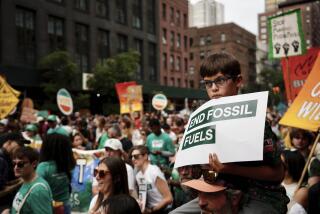A carbon-neutral editorial
- Share via
AL GORE’S FAVORITE MOVIE about global warming, “An Inconvenient Truth,” is being touted as “the first carbon-neutral documentary ever.” This does not mean that the movie’s crew bicycled to shoots, used hand-cranked cameras or avoided all petroleum-based products during filming. Publicists still used up jet fuel on their promotional junkets, as did Gore. Craft services no doubt served M&Ms;, poured from landfill-clogging plastic bags.
Being “carbon-neutral,” in this case, means calculating the production’s “carbon footprint,” which is jargon for how much energy was used to make and promote the movie. That will include “all travel, office and accommodations-related emissions,” according to the film’s producers. Once they come up with the numbers, Vermont-based NativeEnergy will calculate the footprint, and the producers will send the company $12 a ton to pay for those emissions. NativeEnergy plans to use the money to help build new Native American and farmer-owned renewable energy projects.
And you thought it was just a movie.
In Hollywood, carbon offsets are the successor to the Prius: the hippest way for stars to flaunt their conspicuous non-consumption. Pearl Jam and the Foo Fighters offset tour emissions by protecting forests. Leonardo DiCaprio, Cameron Diaz and Brad Pitt invested in trees too. The producers of “Syriana” got into the act. This year’s Super Bowl was “carbon-neutral” -- and so was the World Cup.
But why let the famous people have all the fun? Regular folks can buy carbon offsets too, using any of a number of Internet-based calculators to measure their own carbon footprints and purchase affordable mini-offsets, which might run anywhere from $30 to a few hundred dollars. Some websites will even send a decal or sticker suitable for the bumper of a Prius. Or Hummer, as the case may be.
It’s a nice idea, as far as it goes -- a little consciousness-raising can be a good thing, and it certainly doesn’t hurt to get more windmills spinning on the grid. But as some environmentalists have noted, this kind of do-gooder consumerism doesn’t necessarily achieve an overall net reduction of greenhouse gas emissions (which is, after all, the ultimate goal).
That will take regulatory oversight and global coordination. Not to mention a dose of real sacrifice from all of us -- including those of us who live in 15,000-square-foot estates in Beverly Hills and travel in private jets.
More to Read
Sign up for Essential California
The most important California stories and recommendations in your inbox every morning.
You may occasionally receive promotional content from the Los Angeles Times.













